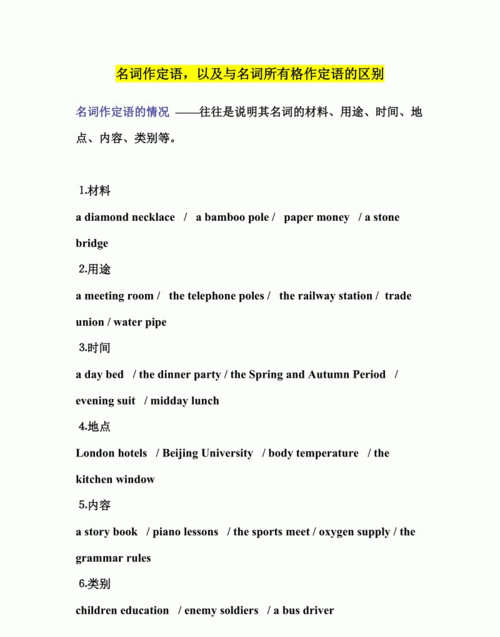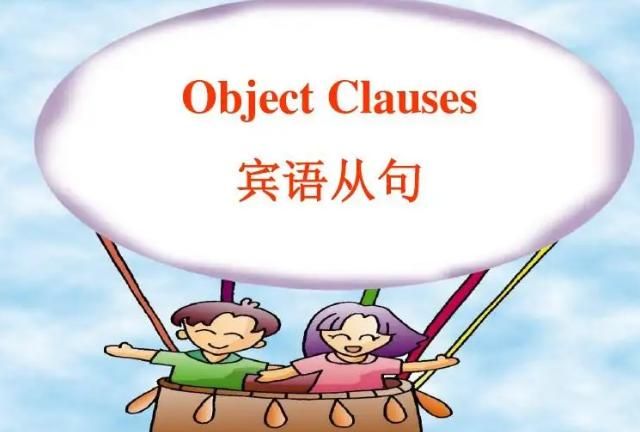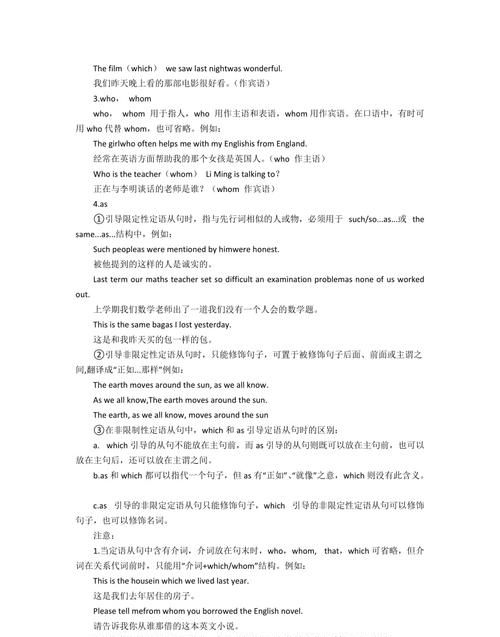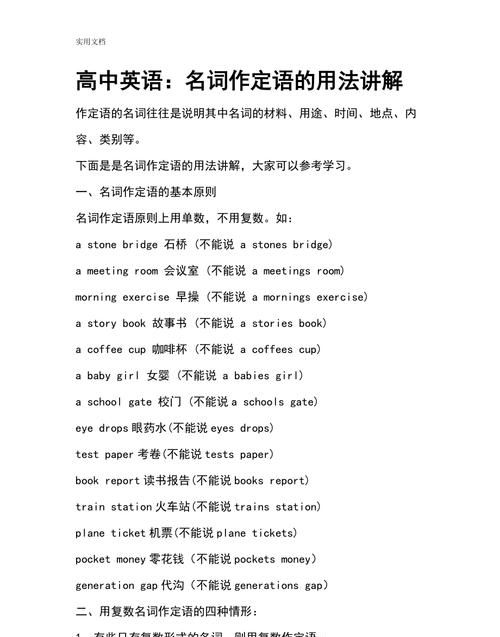本文目录
限制性定语从句例句
名词性定语从句例句 1
一.主语从句
1、Who was responsible for the accident is not yet clear.
2、Why he left so abruptly is not known to any of us.
3、When he’ll be back depends much on the weather.
4、Whether she comes or not doesn’t concern me.
5、Wherever he once lived is well preserved.
6、It is natural that they should have different views.
7、It was quite plain that she didn’t want come.
8、It’s a pity that he can’t swim.
9、It was a fearful disappointment to your mother that you didn’t come yesterday.
10、It happened that she wasn’t in that day.
11、It struck me that we ought to make a new plan.
12、It was rumored that he was suffering from a tone in the kidney.
13、It is estimated that 25 million school lunches are sold each day.
14、Where I spend my summer is none of your business .
15、It’s doubtful whether the payment is legal.
16、It was a question whether he should get married.
17、What the professor said is of great importance.
18、Whoever break the rules will be punished.
19、Who killed the scientist remains a question.
20、It doesn’t matter whether she will come or not.
二.宾语从句
1、 We never doubt that he is honest.
2、 I can’t imagine what made him act like that.
3、 Nobody can tell when she will arrive.
4、 Before I came downstairs I had prepared myself very carefully for what I must say.
5、 You must give it back to whoever it belongs to.
6、 I’ve heard that you’ve won a scholarship.
7、 I feel it a terrible thing that my mother should have to toil so endlessly.
8、 We are talking about whether we admit students into our club.
9、 He told me that he was preparing for the English test.
10、Our teacher told us that light travels much faster than sound.
11、Can you tell me how I can get to the zoo?
12、The doctor insists that I give up smoking.
13、She remember nothing about him except that his hair is black.
14、I suggest that they shouldn’t drive along the coast.
15、Have you found out how wide the ditch was?
16、Tomorrow at this time we will know who is elected?
17、Everybody knows that money doesn’t grow on tree.
18、The villager didn’t realize how serious the pollution was until the fish in the river died.
19、She said that she would come to the meeting.
20、The book will tell you what the best CEO should do.
三.表语从句
1、The fact is that he didn’t notice the car until too late.
2、The mystery is whether he ever went there at all.
3、The question is why he likes the place so much.
4、The problem is not who will go but who will stay.
5、Your brother’s health is not what it used to be.
6、The question is whether they will b able to help us.
7、His suggestions is that we should stay calm.
8、It sounds as if someone is knocking at the door.
9、He looked just as he had looked ten years ago.
10、That is because he didn’t understand me.
11、That is why he got angry with me.
12、The problem is who we can get to replace her.
13、The trouble is that I lost her address.
14、The questions is whether we can rely on him.
15、That is because we are in need of money at that time.
16、He looked as if he was going to cry.
17、The reason why he has to go is the his mother is ill in bed.
18、The questions is whether it is worth doing.
19、The mountain is no longer what is used to be.
20、The questions is what caused the accident.
四.同位语从句
1、They had to face the fact that the nea
rest filling station is 30 miles away.
2、Have you any idea how soon they are coming?
3、Obviously there was little probability that they would succeed, but they didn’t mind.
4、The suggestion that the new rule be adopted came from the chairman.
5、There is a feeling in me that it is going to rain.
6、The proposal has been put forward that the flight should be cancelled.
7、The government gave an order that all the house should be pulled down in three weeks.
8、We haven’t settled down the question where we are going to spend our summer vocation.
9、There is no doubt that he will keep his promise.
10、Many British parents hold the view that teenagers shouldn’t spend too much time online.
11、The thought that they could cross the whole continent was exciting.
12、I’ve come to the conclusion that it was unwise to do that.
13、They expressed the wish that she accept the award.
14、The question whether it is right or wrong depends on the result.
15、The rumor spread that a new school would be built here.
16、The questions who should do the work require consideration.
17、The suggestion that the new rule be adopted came from the chairman.
18、The news that oil price will go down is untrue.
19、The question why so many animals died suddenly in that area remains unsettled.
20、We have no scientific proof for the idea that time travel is impossible.
名词性定语从句例句 2
that常用作关系代词,可指代某人,也可指代某物,指物时有的时候可用which替换that,指人时可用who替换。但在下列情况下,一般用that。
一、that指代某物事时
1.先行词为all, few, little, much, the one, something, anything, everything, nothing等时。如:
(1)We'll do all that we can to protect the endangered plants and animals.
我们将尽我们的最大努力来保护那些濒危的动植物。
(2) There is much that I wan to tell you.
我有很多想要告诉你的话。
(3) Is there anything that I can do for you?
有什么我可以帮你的吗?
2. 先行词被all, every, no, some, any, (a)few, (a)little, much等限定词修饰时。如:
(4) You can borrow any book that you want to read in our school library.
在我们图书馆,你可以借任何你想读的书。
3. 先行词被序数词或形容词最高级修饰时。如:
(5)This is the most beautiful city that I've ever seen.
这是我见过的最漂亮的城市。
4. 先行词被the only, the very, the right, the last 等修饰时。如:
(6)This is the very factory that they visited last summer holiday.
这恰好是他们去年参观的那个工厂。
(7)This is the only painting in this style that we have.
这种风格的画我们仅有一幅。
5. 先行词是并列结构,既有人又有物时。如:
(8)He talked happily of the writer and his books that interested him.
6. 先行词前有the same 修饰,表示和先行词是同一物时。如:
(9)This is the same purse that I lost yesterday.
这就是我昨天丢的那个钱夹。
注:如果表示的是与先行词同一类或相似的某物,则用the same…as….如:
(10)This is the same purse as I lost yesterday.
这个钱夹和我昨天丢的那个一样。
7. 先行词为数词时。
(11)Look at the books on the bookshelf. You can see the two that you bought me for my birthday.
瞧书架上那些书。你可以看到我过生日时你买的那两本。
8. 如果which引导的定语从句中又含有一个定语从句,为避免重复,第二个定语从句用that。如:
(12)They built a factory which produced things that had never been seen.
他们建了一工厂,生产以前从未见过的东西。
9. 以which作主语开头的特殊问句,为了避免重复,定语从句用that。如。
(13)Which is the bus that you will take?
你要乘的是哪一班车?
10. 关系代词在定语从句中作表语时,而且通常省略。如:
(14)My hometown is no longer the place that it used to be.
我的`家乡再也不是以前那个样子了。
11. 关系代词在there be 句型中作主语时,而且常可以省略。如:
(15)This is the fastest train (that) there has ever been.
这是有史以来最快的列车。
二、that 指代某人时。
1. 泛指某人时。如:
(16)He is a man that is never at a loss.
他是一个从未一筹莫展的人。
2. 主句是以作主语的who开头的特殊问句,为了避免重复时。如:
(17)Who is the person that is talking with our headmaster?
和我们校长说话的那人是谁?
3. 先行词前有the same时。如:
(18)This is the same man that gave us a talk last year.
这和去年给我们作报告的是同一人。
4. 关系代词在定语从句中作表语时。如:
(19)He has changed. He was not the man (that) he was 10 years ago.
他变了。他再也不是10年前的他了。
另外,that也可用作关系副词,表示时间、地点、原因和方式,在口语中可以用来代替when, where, why 引导的定语从句。在以下名词day, year, time, moment, reason, place等作先行词时,可用that作关系副词引导定语从句。如:
(20)I'll never forget the day (that) I joined the League.
我永远不会忘记我入团的那一天。
(21)Is this the reason (that) they were late for the meeting?
这就是他们开会迟到的原因吗?
(22)We want to find a place (that) we can have a picnic.
我们想找一个我们能野餐的地方。
(23)This is the first time that I have been abroad for traveling.
这是我第一次到国外去旅游。
(注:先行词是time,前面有序数词或last修饰时,常用that引导定语从句或者省略。)
当先行词为表示方式的词the way时,可用that引导定语从句, that常可以省略。
(24)I don't the way you speak to her.
我不喜欢你和她说话那种方式。

英语中名词作定语和形容词作定语的区别
a woman teacher 一名女教师some women teacher 几名女教师an apple tree some apple trees 名词作定语的情况 作定语的名词往往是说明其中名词的材料、用途、时间、地点、内容、类别等.⒈材料 a diamond necklace a ...

英语语法中定语,状语,谓语,表语的位置
一名词作定语
1、名词作定语原则上用单数,不用复数 举例:a story book 故事书 (不能说 a stories book)
2、 有些只有复数形式的名词,则用复数作定语 举例:an arts degree文科学位
3、有些习惯上通常要用复数的名词也习惯上用复数 举例: savings bank储蓄银行
4、有时复数名词作定语可视为复数名词所有格作定语的省略形式 举例:a teachers college 师范学院(teachers等于teachers')
二、形容词修饰不定代词 一般是形容词放在代词之后 举例:Can you give me something useful?
三、定语 定语是用来修饰、限定、说明名词或代词的品质与特征的。 主要有形容词此外还有名词、代词、数词、介词短语、动词不定式(短语)、分词、定语从句或相当于形容词的词、短语或句子都可以作定语。 分类: 非限制性定语从句、定于前置、定语后置、定语从句····
四、代词 是代替名词的一种词类。大多数代词具有名词和形容词的功能。英语中的代词,按其意义、特征及在句中的作用分为:人称代词、物主代词、指示代词、反身代词、相互代词、疑问代词、关系代词、连接代词和不定代词九种。
代词分类: 1)人称2) 物主3)反身 4)相互 5)指示 6)不定7)疑问8)关系9)连接10)替代词
人称代词 物主代词 指示代词 反身代词 疑问代词 不定代词 关系代词 相互代词 连接代词

在英语中名字的正确格式
a woman teacher 一名女教师
some women teacher 几名女教师
an apple tree
some apple trees
名词作定语的情况
作定语的名词往往是说明其中名词的材料、用途、时间、地点、内容、类别等。
⒈材料
a diamond necklace
a bamboo pole
paper money
a stone bridge
⒉用途
a meeting room
the telephone poles
the railway staion
trade union
water pipe
welcome speech
eye drops
⒊时间
a day bed
the dinner party
the Apring and Autum Period
evening suit
midday lunch
⒋地点
London hotels
Beijing University
body temperature
the spaceship floor
the kitchen window
⒌内容
a story book
piano lessons
the sports meet
oxygen supply
the air pressure
the grammar rules
⒍类别
children education
enemy soldiers
a bus driver
作定语用的名词一般没有与之相应的同根形容词。它既可以是有生命的,也可以是无生命的;既可以是可数的,也可以是不可数的。它能表明被修饰的名词的A.地点、B.时间、C.目的或用途、D.种类、E.原料或来源等等。例如:A.city streets城市街道,a corner shop街道拐角的商店,a kitchen table厨房桌子,a roof garden屋顶公园;B.summer holidays暑假,Sunday papers星期日报纸,November fogs十一月的雾季;C.a tennis court网球场,a tennis club网球俱乐部,a peace conference和平会议,milk bottles牛奶瓶;D.a love story爱情故事,a murder story凶杀案故事,traffic lights交通管理用的红绿灯,a train driver火车司机;E.stone walls石墙,straw hats草帽,rubber boots胶鞋,pineapple juice菠萝汁,plant fat植物脂肪。
名词作定语时,一般用单数形式,但在个别情况下也有用复数的。例如:
goods train货车,sports meeting运动会,machines hall展览机器的大厅。
注意:被修饰的名词变复数时,一般情况下,作定语用的名词不需要变为复数形式,但由man或woman作定语修饰的名词变成复数时,两部分皆要变为复数形式。例如:
man doctor—men doctors 男医生
woman singer—women singers 女歌手
有的作定语用的名词有与之相应的同根形容词。一般情况下,名词作定语侧重说明被修饰的名词的内容或性质;同根形容词作定语则常常描写被修饰的名词的特征。例如:"bold watch"指手表含有金的性质;而"golden watch"则表示手表是金色的特征,不一定含有金。再举两例:
stone house 石头造的房子
stony heart 铁石般的心肠
peace conference 和平会议
peaceful construction 和平建设
名词作定语与名词所有格作定语有时是有区别的。一般来说,名词作定语通常说明被修饰的词的性质,而名词所有格作定语则强调对被修饰的词的所有(权)关系或表示逻辑上的谓语关系。例如:在“the Party members(党员)”中,名词定语表示members的性质;在“the Party's calls(党的号召)”中,Party具有动作发出者的作用,calls虽然是名词,却具有动作的含义。再举一例:
a student teacher 实习教师
a student's teacher 一位学生的老师

以上就是关于名词作定语的例句英语 ,限制性定语从句例句的全部内容,以及名词作定语的例句英语 的相关内容,希望能够帮到您。
